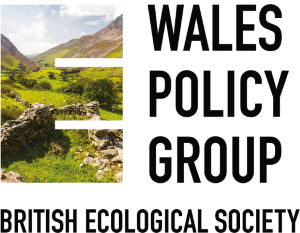Caffi Ecology: Net Benefits for Biodiversity
The BES Welsh Policy Group (WPG) hosted its first Caffi Ecology event on Net Benefits for Biodiversity on 2nd March 2023. Here we highlight the evening’s discussions.

Caffi Ecology events are opportunities for networking and knowledge exchange that bring together experts from across the research, consultancy, policy and practitioner communities, who may not often have the chance to connect. These events consist of a series of short expert talks followed by group discussions, all of which aim to explore important aspects of a timely and policy-relevant topic.
For the first instalment in this event series, 35 people, including research and consultant ecologists, public agency and government staff, and students, discussed the advantages and potential drawbacks of the approach to Net Benefits for Biodiversity in Wales, and how it compares to the English Biodiversity Net Gain framework. The four speakers at the event were:
- Dr Emma Gardner – UK Centre for Ecology and Hydrology
- Dr Ed Shepherd (MRTPI MRICS) – School of Geography and Planning at Cardiff University
- Sarah Simons (MCIEEM CEnv) – Amey
- Sarah Ayling – Natural Resources Wales
This blog will summarise the evening’s discussions. For more information, read the full report.
Key terms
Net Benefits for Biodiversity (NBB) is the approach that developers in Wales will have to use to demonstrate that they have met their obligations to maintain and enhance biodiversity and build resilient ecological networks.
DECCA is the framework that Natural Resources Wales (NRW) has developed for evaluating ecosystem resilience to demonstrate NBB. This is based on five attributes:
- Diversity
- Extent
- Condition
- Connectivity
- Aspects of ecosystem resilience
Biodiversity Net Gain (BNG) is a similar approach to NBB, and the one that is being used in England. The differences between BNG and NBB are that BNG:
- Is metric-driven, and is based on the Biodiversity Metric developed by Natural England
- Focuses on individual habitats rather than on ecosystem resilience
- Is uniform across the country
- Allows offsetting and biodiversity unit markets, even though in their response to the Consultation on Biodiversity Net Gain regulations and implementation, the UK Government said that it will incentivise a preference for on-site gains over off-site gains
Key points from the speakers
NBB avoids some of the pitfalls of BNG by encouraging a progressive focus on ecosystem processes, landscape context and use of ecological expertise rather than solely relying on a metric. The approach requires the authorities that grant permissions to developments to ensure ‘no significant loss’ and ‘net benefit’. In order to do so, they need to take into account that losses of habitat are more significant for species that have very small ranges and specialist requirements. They also need to make sure that no species, or groups of species, are consistently slipping through the net in calculations of net benefit.
Models that are used in planning, including those that will be used to implement NBB, can obscure underlying social and environmental realities. There is a risk that the focus on assessments of baselines and net gain through models and spreadsheets may lead us to overlook the needs of the species and habitats that need to be protected and restored. Without thorough monitoring and biological understanding, there is a chance that increases in biodiversity in the models is not reflected by increases in the real world.
When implementing NBB, there is as yet no mechanism to secure net benefit sites in the long term and ensure that management and monitoring commitments are met. This is a challenge for ecological consultancy and impact assessment experts.
Discussion
After the talks and a dinner of plant-based pie, mash and gravy, attendees divided into groups to discuss three questions. These discussions clearly showed that there are a lot of questions about the implementation of NBB that still have to be answered.
Question 1 – Will we ever know whether NBB succeeds?
There is currently no definable endpoint and no definite picture of what the success of NBB would look like. The lack of good baseline biodiversity data for lots of areas and species may make measuring any benefits difficult. Finally, it is still unclear who will be responsible for financing and conducting monitoring activities. Assessing outcomes may be more difficult for NBB than for BNG because there is a trade-off between the holistic approach that Wales is taking, and the ability to measure benefits and successes.
Question 2 – Will NBB increase the costs of developments, and therefore housing, energy, and industrial property?
The general view was that these costs may be increased, but this may not be a bad thing. Without policies like this there will be other, and much greater, costs in the longer term related to environmental degradation, and decreased human health and well-being. Enhanced ecosystem services may mitigate or offset the increased costs if they are properly valued and included in economic calculations.
Any cost increases should not be automatically passed on to residents and communities. Costs should be shared fairly and transparently between government, developers and individuals. There are ways to limit the increases in costs including using technology such as eDNA to improve the efficiency of monitoring.
Different approaches for small scale and large-scale developments could also be used to match burden with capital and capacity. The Welsh Government also has to limit loopholes that may be utilised by companies to minimise their obligations to provide habitat and increase biodiversity.
Question 3 – Do local authorities have the capacity to adequately assess NBB?
The answer to this question was an almost unanimous no, as local authorities are already overstretched on basic functions. The discussions then moved on to why this is the case, how specific capacity gaps can be identified, and how these can be rectified. The main solution to this is better funding, although there was no definite answer regarding from which sources.
Learn more about policy making in Wales

The WPG has some more exciting work coming up aimed to help ecologists engage with policymaking in Wales. We are hosting a policy training in collaboration with the Vincent Wildlife Trust in Devil’s Bridge on Wednesday 26th April that will cover the basics of how environmental policy is made in Wales, including expert talks on species conservation and reintroduction policy, and an outdoor pine marten tracking activity!
We will shortly be publishing a policy guide, which will cover the basics of how policy and legislation are made in Wales, how evidence is used in those processes, and the major environmental strategies and legislation. After that, we will publish a horizon scan that will summarise the major drivers of ecological change in Wales over the next 10 years.
All this, and any future work, is publicised on our website, on our Twitter, and through our newsletter! All BES events are advertised on our BES events page and you can read our previous policy event reports and our blogs for further information.
Like what we stand for?
Support our mission and help develop the next generation of ecologists by donating to the British Ecological Society.